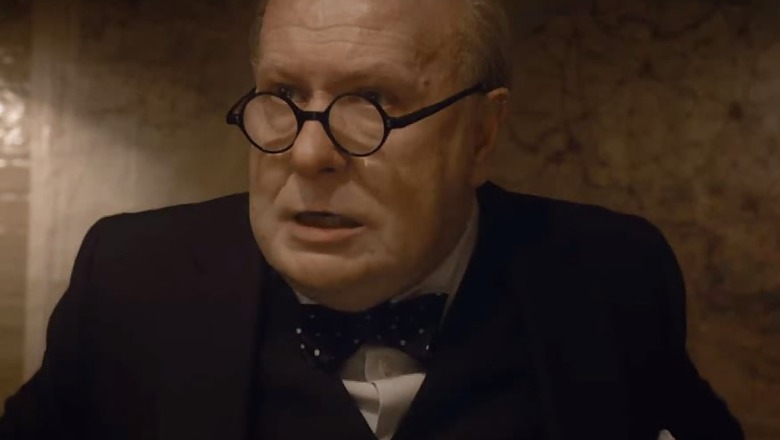Darkest Hour Movie Review: Gary Oldman Humanises The Brutal Historic Figure With His Vulnerabilities

views
There was a time when biographical dramas used to be about covering the life of the subject from cradle to grave (or old age). However, in recent times, filmmakers have started focusing on certain interesting chapters from the lives of iconic figures and turning them into an intriguing, even if preachy, watch with a certain pace. Joe Wright's biopic on Britain's historic Prime Minister Winston Churchill serves as an example of this. Darkest Hour, features Gary Oldman, one of most prolific Britons, who got the reigns of the nation during its most turbulent times and did his best to save the empire from falling into the hands of the Nazis.
The film has already got its share of acclaim internationally with Golden Globes and BAFTA nominations and Oldman winning his first globe for the heartfelt portrayal of an otherwise ruthless man. Ironically, in India, the man holds a certain reputation. Churchill is held responsible for the Great Bengal famine in 1943, where the charismatic leader failed to take any action to save the people of the 'then-slipping' nation. Therefore, trying to connect the audience here with a man considered to be a mass murderer could have proven to be a worthless move. However, Gary's humanised portrayal just throws a different light on Churchill's caricature.
In a way, it could be said that Wright and Oldman both re-invented and re-drafted the character of Churchill by bringing to celluloid one of the most daring chapters of his life. The film begins in 1940, when Britain is going through the most critical security situation, on the brink of losing World War II by the hands of German. The Parliament needs a new leader and after much consideration and opposition within the party and even from The King, Churchill is selected to succeed Neville Chamberlain. With almost all the British troops stuck in Dunkirk, Churchill has to steer his nation into a hopeful place, while keeping a better option in mind and simultaneously facing the wrath of his own council members.
How he made Operation Dynamo a success and became the hero Britain needed is something one can find in any history book. However, it is the screenplay and Oldman's vulnerabilities as Churchill that makes it a piece worth-watching. The ever poetic Churchill might come across as a crass leader in a time of declining aristocracy, but it's his fears and doubts in front of his wife Clementine (Kristin Scott-Thomas) and secretary Elizabeth (Lily James) that strike a chord. The way he pleads Frank D Roosevelt (The President of USA) for help and gets disappointed, stops and mumbles before ‘hailing Hitler’, and reads the signs before heading to the negotiation meeting are few of the key highlights that might've been dramatized to the core, but definitely brings meaning and a positive strength to his character. All that with Oldman's wise, brooding eyes, which are a character in themselves.
The entire sequence where Churchill rides the Underground with his countrymen of every colour might even be fictional and corny to an edge, but instead of making it an insignificant piece of history, it builds his character (even if imaginarily). The world knows Churchill's view on minority and with just a single scene, Wright tried to retouch it, successfully.
Christopher Nolan beautifully presented the military side of Britain's most vulnerable rescue mission in Dunkirk, where the narrative became the lead, Joe Wright gives it all to Oldman in Darkest Hour. You live the mission alongside Churchill, getting into his skin and his fears and sympathising with him to a point that when the last frame ends, your heart fills with pride, only to realise the massacre the real man brought in your own country. Isn't this an example of brilliant and successful storytelling?
Take a bow, Wright and Oldman.
Rating: 3.5/5




















Comments
0 comment